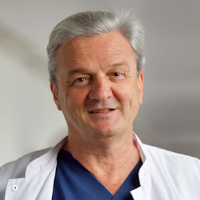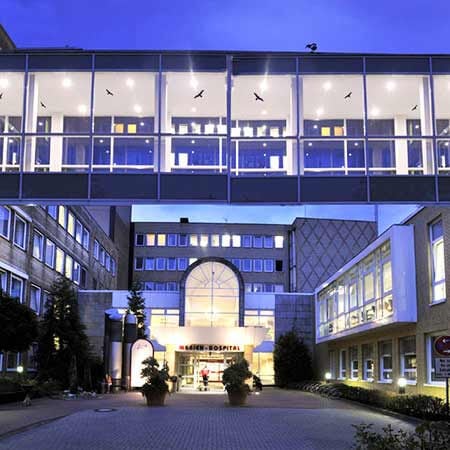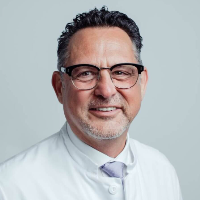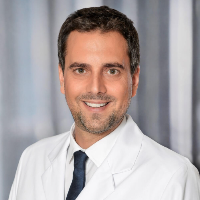Treatment for Benign Prostatic Hyperplasia (BPH) with Transurethral Needle Ablation (TUNA) in Germany
Treatment prices are regulated by national law of the corresponding countries, but can also include additional hospital coefficients. In order to receive the individual cost calculation, please send us the request and medical records.

Department of Adult and Pediatric Urology, Andrology
The Department of Adult and Pediatric Urology, Andrology offers the full range of services in the areas of its specialization. Men and boys with diseases of the reproductive system can be diagnosed and treated in the medical facility. Doctors also treat infertility and erectile dysfunction. Medical care is provided to men and women with diseases of the urinary system, namely kidneys, ureters, bladder, and urethra. The department is certified as the Prostate Cancer Center by the German Cancer Society (DKG), which indicates the excellent quality of the services provided in this area. The department's urologists have a perfect command of the innovative treatment methods, including holmium laser enucleation of the prostate (HoLEP), photodynamic therapy, and da Vinci robot-assisted surgery. The department employs comprehensively trained and experienced doctors who apply advanced medical achievements in their practice. Each patient is provided with an individual approach, considering their specific needs and wishes.







Department of Adult and Pediatric Urology, Andrology
The Department of Adult and Pediatric Urology, Andrology offers the full range of diagnostic and therapeutic services for patients with diseases of the urinary system and for men with pathologies of the reproductive system. The team at the medical facility also admits children and adolescents with urologic diseases. The department has 62 beds for inpatient treatment. Therapeutic options include both conservative and surgical techniques. Many operations are performed using the innovative da Vinci surgical system. The department also successfully uses modern laser systems, including the GreenLight laser, a holmium laser, a thulium laser and the laser for water vapor thermal therapy. The key focus of the department's work is on cancer surgery for malignant diseases of the prostate, bladder, kidneys, and testicles. The department also specializes in the treatment of urinary incontinence and pediatric urologic pathologies. Prostate diseases are treated in a specialized center certified in accordance with the DIN EN ISO 9001 requirements.




Department of Adult and Pediatric Urology
The Department of Adult and Pediatric Urology provides high-precision diagnostic examinations and effective treatment for diseases of the genitourinary system and reproductive system in men and boys. Of particular interest is drug therapy and surgical treatment of prostate, bladder, kidney, testicular, and penile cancers. The department is part of the Comprehensive Cancer Center Ulm (CCCU). For the patient, this means that their clinical case is studied by a multidisciplinary tumor board, which determines the optimal treatment tactics. The department is also certified by the German Cancer Society (DKG), so all therapeutic procedures meet strict national and international standards. The department's team of urologists also has unique clinical experience in the minimally invasive treatment of kidney stone disease, benign prostatic hyperplasia, neuro-urological dysfunction, and all urologic diseases in children. During the surgical treatment, the specialists at the medical facility successfully use minimally traumatic surgical techniques. They perform endoscopic, laser, minimally invasive, and robot-assisted surgery using the innovative Da Vinci system. The department treats about 3,000 inpatients and 9,000 outpatients with clinical cases of varying complexity annually. The number of surgical procedures performed and treatment outcomes are regularly published by the authorized commission of the Initiative Quality in Medicine (IQM).






Transurethral needle ablation (TUNA) is a minimally invasive outpatient medical procedure used in urology for the treatment of benign prostatic hyperplasia (BPH). Although its popularity has declined since the 1990s, it is still practiced in some German hospitals as a safe, sparing, and non-traumatic alternative to transurethral resection of the prostate (TURP). You can check the cost of treatment, compare prices in German hospitals, and make an appointment for your treatment in Germany on your preferred dates through the Booking Health service.
Content
- Who may be a candidate for TUNA for the treatment of BPH?
- Preparation for the TUNA medical procedure for the treatment of BPH
- How is TUNA performed for BPH?
- After the TUNA procedure for BPH
- TUNA results for BPH
- Advantages and disadvantages of TUNA for BPH
- Treatment in Germany for benign prostatic hyperplasia
TUNA is a minimally invasive treatment for benign prostatic hyperplasia (BPH) that uses radiofrequency energy to reduce prostate volume, alleviating urinary symptoms.
TUNA offers fewer complications, shorter recovery time, and can be performed as an outpatient procedure, making it attractive for medical tourism in Germany.
TUNA cost varies by hospital and individual case. Booking Health provides detailed treatment price information and payment options for top hospitals in Germany.
Expect a short hospital stay, typically 1-2 days. The minimally invasive procedure allows for quick recovery and return to normal activities.
Contact Booking Health to discuss your case, receive treatment options, and arrange TUNA at a leading German hospital specializing in BPH treatment.
Booking Health connects you with top urologists in Germany experienced in TUNA for BPH. These specialists work at renowned hospitals known for excellence in minimally invasive procedures.
Who may be a candidate for TUNA for the treatment of BPH?
Transurethral needle ablation is not the main treatment for benign prostatic hyperplasia in urology. German hospitals use it only for selected categories of patients who meet the following criteria:
- Small prostate volume, typically from 20 to 40 ml
- Urinary tract symptoms
- Contraindications to or refusal of general anesthesia
- Aggravated somatic status (poor health, old age, or the presence of concomitant diseases of the internal organs)
- Low life expectancy
It is technically possible to perform the medical procedure on larger prostate volumes, from 40 to 100 ml. In these cases, the risk of recurrence of the symptoms of benign prostatic hyperplasia in the next few years is higher, so TUNA is used for volumes over 40 ml only if there are contraindications to other treatment options.
Preparation for the TUNA medical procedure for the treatment of BPH
As part of the preparation, patients may be prescribed a course of oral antibiotics, and a single intravenous or intramuscular injection of an antibacterial agent is done on the day of the medical procedure to lower the risk of infectious complications.
Prior to transurethral needle ablation, a PSA test is required to assess the risk of cancer. If the PSA level is greater than 4 ng/mL, a prostate biopsy will be performed. If the PSA level is greater than 10 ng/mL, transurethral needle ablation is not recommended, even if the biopsy is negative. In such cases, methods involving the removal and extraction of prostatic tissue for subsequent histological examination to exclude prostate cancer should be preferred.
Just before the medical procedure, the doctor will perform a flexible cystoscopy (endoscopic examination of the bladder) to rule out a high bladder neck, bladder cancer, and urethral stricture.
How is TUNA performed for BPH?
Transurethral needle ablation is performed on an outpatient basis under local anesthesia, which is the main advantage of this method of treatment of benign prostatic hyperplasia.
The main method of pain relief involves blocking the periprostatic nerves with local anesthetics. These drugs temporarily block the conduction of pain impulses from the prostate tissue. Oral and sometimes intravenous sedation (administration of sedatives) may also be used.
Patients undergo TRUS (transrectal ultrasound) to measure the prostate. Based on these results, the needle length and depth of needle insertion into the prostate tissue are planned to perform radiofrequency ablation for benign hyperplasia.
A catheter is placed into the bladder. The organ is then anesthetized with the instillation (administration into the bladder) of a cold solution of local anesthetics. This temporarily "turns off" the sensitivity of the mucous membrane.
The urologist then performs the TUNA procedure. The doctor inserts a needle sequentially into different areas of the prostate gland and uses radiofrequency energy to destroy the prostatic tissue. Ablation is achieved by heating. High-frequency electromagnetic waves are used to heat the prostatic tissue. The fluid absorbs the energy. It is instantly heated and vaporized from the cells.
The procedure typically involves the ablation of eight parts of the prostate: three at the bladder neck, two at the median lobe, and three at the apex of the prostate.
The procedure time, including flexible cystoscopy, TRUS, and direct needle ablation of the prostate adenoma, averages 45 minutes. The transurethral ablation itself, excluding preparation, takes an average of 27 minutes.
The procedure is well tolerated even without sedation and general anesthesia, with an average pain score of 3 on a 10-point scale. The use of sedation can relieve the patient of even minor discomfort.
After the TUNA procedure for BPH
Following transurethral ablation, patients stay in the hospital for 4 hours under medical supervision. After a follow-up examination, they are discharged home with a urethral catheter that is removed in a few days.
The need for catheterization is related to the swelling of the prostate tissue that occurs as a result of its trauma. This is a temporary phenomenon. The catheter is removed after 2-5 days, by which time the urinary tract returns to normal in 86% of patients. If temporary dysuria persists, the catheterization period is extended to 5-7 days.
TUNA results for BPH
TUNA is an effective procedure for the treatment of benign prostatic hyperplasia. It eliminates symptoms in the majority of patients. IPSS improves by an average of 65% and quality of life improves by 75%.
Only a third of patients require continued drug therapy after needle ablation. The need for repeated invasive procedures and surgery is as follows:
- Within 1 year after the procedure – 2.5%
- Within 2 years after TUNA – 7%
- Within 5 years – 12%
The average time without the need for invasive treatment is 8 years. The average time to recurrence of symptoms is 6 years.
Advantages and disadvantages of TUNA for BPH
The main advantages of the TUNA procedure are:
- Extensive experience with the procedure because it has been used in clinical practice for more than 30 years, so many studies have proven its high clinical effectiveness and safety
- Outpatient procedure (without a hospital stay)
- No general anesthesia required
- Can be performed on patients with poor health and comorbidities
- Minimal risk of complications
- Short and comfortable recovery
- Long-term results lasting 4-7 years
- Low cost of treatment
The disadvantage of TUNA is that the clinical effect is temporary. Some of the prostate tissue remains, so the symptoms of benign hyperplasia may recur. Sooner or later, many patients will require repeated invasive procedures or surgery.
Treatment in Germany for benign prostatic hyperplasia
German urology centers have state-of-the-art equipment and experienced specialists, which is why patients from all over the world come to Germany for treatment. You can also benefit from the services of doctors in German hospitals to expect good clinical results of treatment with a low risk of complications.
If you want to undergo your treatment in Germany, you are welcome to visit the Booking Health website to check the cost of treatment and compare prices in German hospitals. Please leave your request on the website to get advice from medical tourism specialists. The Booking Health team will help you choose the most suitable German hospital and organize your treatment in Germany.
Authors:
The article was edited by medical experts, board certified doctors Dr. Nadezhda Ivanisova and Dr. Vadim Zhiliuk. For the treatment of the conditions referred to in the article, you must consult a doctor; the information in the article is not intended for self-medication!
Our editorial policy, which details our commitment to accuracy and transparency, is available here. Click this link to review our policies.
Sources:

